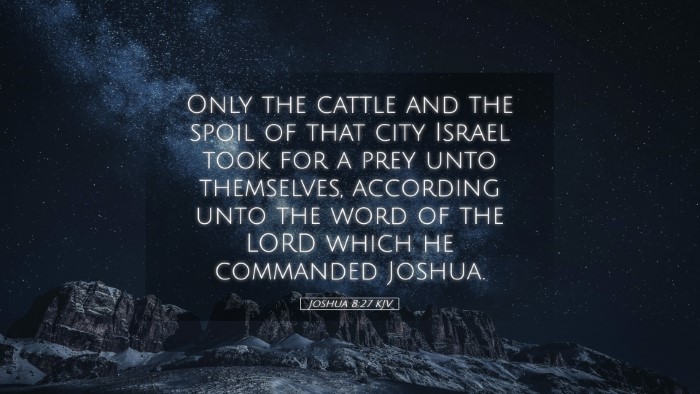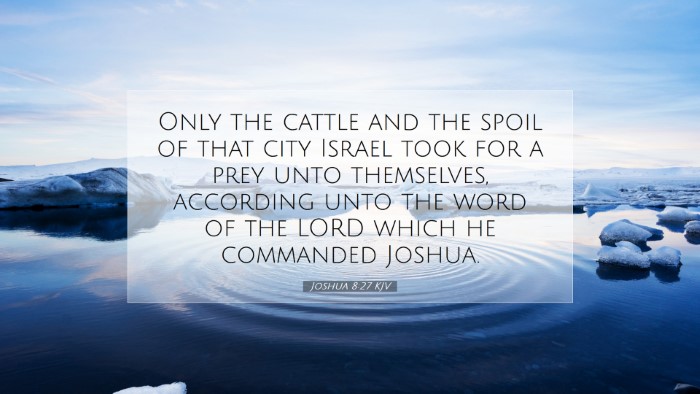Bible Commentary on Joshua 8:27
Verse Context: Joshua 8:27 states, "Only the livestock and the spoil of that city Israel took as their prey, according unto the word of the LORD which he commanded Joshua." This verse is pivotal in understanding the unfolding of God's commands and the faithfulness of the Israelites in their conquests.
Introductory Insights
This verse emerges in the backdrop of the larger narrative of Israel’s conquest of Canaan. After the victory at Ai, the mention of livestock and spoil showcases the principle of divine instruction in warfare. The Israelites did not merely act on impulse but adhered closely to God's commands, reflecting their commitment to His will.
Theological Implications
-
Divine Instruction:
As noted by Matthew Henry, the adherence to God's command illustrates the importance of divine guidance in all aspects of life. The distinction made concerning livestock and spoils underlines the notion that God had a prescribed method for Israel’s actions.
-
Understanding Spoils:
Albert Barnes emphasizes that the spoils taken from Ai were not arbitrary but rather part of a divine strategy. God allowed the Israelites to benefit materially from their obedience, a reward that symbolizes the broader spiritual rewards that come from faithfulness.
-
Separation of Resources:
Adam Clarke points out that the focused selection of spoils—restricted to livestock and goods—was designed to teach the Israelites about the stewardship of what God provides. Indeed, the spoils represented a tangible expression of divine favor upon those who obey.
Practical Application
The text encourages pastors and scholars to reflect on the concept of obedience in practical terms. The Israelites' restraint in taking the spoils aligns with the ethical and moral implications of stewardship and resource management in today’s context.
Key Principles for Application:
-
Obedience to Divine Commands:
This passage serves as a reminder that obedience to God’s instructions leads to His blessings. The Israelites’ choice to follow God’s guidelines about the spoils encourages believers to seek divine direction in every area of their lives.
-
Accountability and Stewardship:
Modern believers are called to appropriate the notion of stewardship. Just as the Israelites were accountable for their actions post-victory, so too must we consider the way we utilize resources entrusted to us.
-
Trust in God’s Plan:
By recognizing the deeper purpose behind the command regarding the spoils, contemporary readers can gain insights into trusting God's overarching plan in their lives, even when it seems challenging to discern.
Historical Background
The conquest of Ai represents a critical moment in Israel's history. Following the sin of Achan, which resulted in a setback for Israel, their subsequent victory at Ai was a testament to the necessity of corporate obedience to the Lord.
Insights from Historical Context:
-
Consequences of Sin:
The defeat at Ai due to Achan’s sin is crucial for understanding this verse. It illustrates the concept that sin can hinder progress and blessings, while obedience leads to victory and reward.
-
God's Faithfulness:
In the narrative's progression, this verse highlights God's unwavering commitment to His covenant with Israel, whereby He provides for their needs as they faithfully execute His will.
Conclusion
Joshua 8:27 encapsulates themes of obedience, divine reward, and stewardship. For pastors and theologians, it serves as a profound reminder of the necessity of aligning actions with divine guidance. The interpretation of this verse urges a holistic view of our responsibilities as believers while also acknowledging the consequences of our choices in relation to God's commands.


